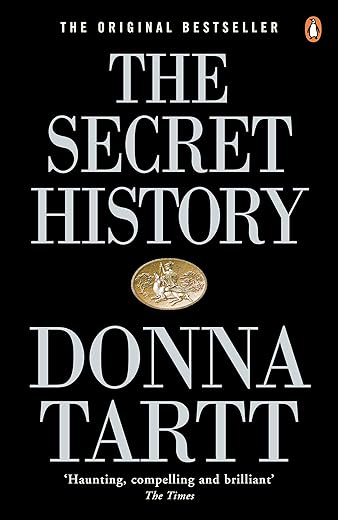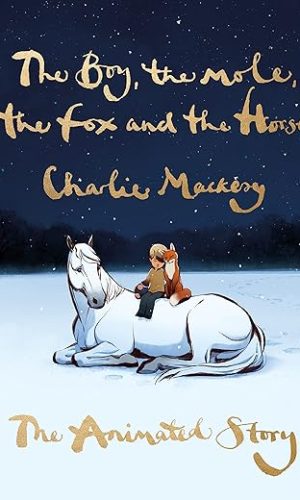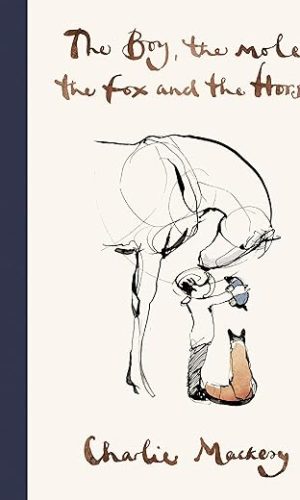The Secret History: From the Pulitzer Prize-winning author of The Goldfinch
£8.70£9.50 (-8%)
THE BESTSELLER THAT DEFINED AN AGE
‘Everything, somehow, fit together; some sly and benevolent Providence was revealing itself by degrees and I felt myself trembling on the brink of a fabulous discovery, as though any morning it was all going to come together—my future, my past, the whole of my life—and I was going to sit up in bed like a thunderbolt and say oh! oh! oh!’
Under the influence of a charismatic classics professor, a group of clever, eccentric misfits at a New England college discover a way of thought and life a world away from their banal contemporaries. But their search for the transcendent leads them down a dangerous path, beyond human constructs of morality.
‘Haunting, compelling and brilliant’ The Times
‘Irresistible and seductive’ Guardian
‘Enthralling… Forceful, cerebral and impeccably controlled’ New York Times
Read more
Additional information
| Publisher | Penguin Books, 1st Ballantine Books Edition (27 May 1993) |
|---|---|
| Language | English |
| Paperback | 503 pages |
| ISBN-10 | 0804111359 |
| ISBN-13 | 978-0140167771 |
| Dimensions | 19.8 x 12.9 x 3.51 cm |





by Christabelle
This book is truly incredible. I loved it and, having finished it missed it so much that within a few days I had started reading it all over again! Having now completed the second reading, I have had to wean myself off it, before ‘The Secret History’ becomes the only story I will ever be able to read! I still open it at random from time to time though and read a little bit, and I think I always will, because the writing is so incredible; certain passages take my breath away. I have never been obsessed with a book in the way that I am with this, and I have been trying to work out just why I love this book so much. I do not really know how to categorise this novel; it doesn’t fit into any particular genre (I wouldn’t exactly describe it as a thriller and it’s certainly not a murder mystery) and doesn’t particularly remind me of anything else I have read. There are loads of books out there about someone having some kind of a secret in their past, but ‘The Secret History’ is so much more than most of these. For some reason it put me a little in mind of Siri Hustvedt’s ‘What I Loved’, but I think this is only because Hustvedt’s is the only book I’ve read in the last few years that has come anywhere near impressing me as much. `The Secret History’ is that elusive mix of a satisfying, literary work combined with an intriguing storyline, which makes it an absolute pleasure to read. It is not a quick, easy read with a surprise on every page; I found that the more I thought about it the more I appreciated it for the masterpiece it truly is.
It is largely the great characterisation which makes ‘The Secret History’. The characters, love them or hate them, are fascinating ones. They are so skilfully portrayed that I feel I know these people and have been spending time with them, in their world. Passages such as the following (which I have read and re-read over and over, because it impresses me so much) are part of what sets this novel in a league of its own: the night after Bunny’s murder, Richard says of one of the others, `All of a sudden I found myself able to see him as the world saw him, as I myself had seen him when I first met him – cool, well-mannered, rich, absolutely beyond reproach. It was such a convincing illusion that even I, who knew the essential falseness of it, felt oddly comforted’. I do not feel, as some people do, that the characters are completely unlikeable, unbelievable, or merely caricatures; I found them to be complex characters who are constantly developed throughout the novel, Charles being the only main character who is maybe somewhat under-developed. Camilla remains somewhat mysterious throughout; she has to as we are seeing her almost entirely through the eyes of the smitten Richard. We are learning more about Henry, Francis and the twins at the same time as is our narrator, the `stilted mannequins’ of our initial acquaintance soon start to come to life for us just as they do for Richard. For me, the early chapters, where the characters are introduced, developed to a point, and the scene is set, are among the best in the novel. Of course our prior knowledge that these privileged young people are doomed serves to greatly increase our interest in them.
I found my opinion of each character frequently shifting throughout the novel, indeed Donna Tartt is adept at manipulating her reader’s sympathies. The way in which she successfully makes Bunny so repulsive in the weeks leading up to his death, while simultaneously painting the others in a fairly sympathetic light, makes it seem plausible that `five reasonable people’ (to use the words of our narrator) plan and carry out the murder of their `friend’.
Julian Morrow is a fabulous invention. The fact that he is present in very few scenes adds to the sense of mystery which envelops him. I don’t think I will ever forget his “I hope we’re all ready to leave the phenomenal world, and enter into the sublime?” at the start of his classes, the irony of course being that by the second time we hear him say this, the real world has become the sublime! The novel also boasts an impressive array of supporting characters, who are very well drawn, believable, have important roles to play and in many cases are very aptly named: Judy Poovey, Cloke Rayburn, Marion and Sophie Dearbold, for instance. I quite liked the way that, by telling us what virtually all even the minor characters are doing now, eight years on, the author neatly wrapped up her story.
I felt that the references to Ancient Greece, the classics and the Greek language, as well as the peppering with little bits of Latin and pertinent lines from French poems helped to make the book what it was. No doubt a person who in `real life’ constantly made such allusions would seem horribly pretentious, but in this book it works, it seems perfectly natural that Francis, rather than telling us simply that he is going to bed, should quote some Charles Baudelaire! The idea of fate too, of events moving inexorably towards a pre-ordained conclusion, is an interesting one in `The Secret History’. At the very start of the novel, Richard ruminates on his `fatal flaw’. Later, reflecting on the Greek language, he describes it as `a language obsessed with action, and with the joy of seeing action multiply from action, action marching relentlessly ahead…in a long straight rank of cause and effect towards what will be inevitable, the only possible end’. The story he is in the process of telling us is clearly moving towards tragedy, its only possible end.
Donna Tartt is able to convey an atmosphere to perfection, whether this is the breathtaking scenery of Vermont and Hampden College, seen through the eyes of a young man who hitherto doesn’t seem to have experienced much beauty in his life; the fragrant, floral intoxication of Julian’s room (I could smell the roses, the bergamot and the tea); the eeriness of a room late at night, lit only by a tiny circle of lamplight, where, over a bottle of whiskey, the group’s awful secret is revealed to the narrator; or the claustrophobia of the Corcoran house the night before Bunny’s funeral, with the torrential rain outside, all sorts of disparate groups and individuals forced to stay under the same roof and be civil to one another, the distraught father veering between despair and forced jocularity, and bored children bickering and getting under everyone’s feet, in the midst of which Bunny’s `friends’ are busy raiding Mrs Corcoran’s drug cache. There is a great deal of humour in the book, albeit most of it of a dark or ironic kind.
I really could discuss `The Secret History’ for ever and a day; there is so much that could be said about it and so many questions to ponder. It’s interesting to consider how close to the truth is the story that our narrator is telling us, in light of the fact that not only do we see lies simply roll of his tongue right from the start (his fictive childhood, telling Bunny that the jacket he has just got from Judy was his grandfather’s), but he even warns us, `If there’s one thing I’m good at, it’s lying on my feet. It’s sort of a gift I have’! Of course, Richard’s version of the story is the only one we will ever have, so in some respects this is a pointless question, although an intriguing one! If you haven’t already read this marvellous book, read it – you’re in for a treat, but be warned: it may just take over your life!
by G. E. Penny
Great book. Be prepared to stay up very late to read this. I justified reading. Think better than The Goldfinch.
Great writer.
by Mithrandir
It’s not often you read a book that utterly bewitches you. Sure, you can love a book, you can love many of them, but it is a rare thing indeed to find one that feels like it was written for only you to read, one that serves almost as a mirror, growing to inhabit your very being. For me, that was The Secret History, published in 1992, debut novel of 29-year-old Mississippi-born Donna Tartt, who actually began writing it a decade earlier while studying at Bennington College in Vermont. And frankly, I cannot believe I lived over nineteen years without it.
The story is written from the point of view of Richard Papen, a quietly eccentric and reserved boy from the fictitious town of Plano in California who secures himself a place at the eclectic Hampden College far away in Vermont. Richard is an unusual narrator in that he exists not only as a means through which we can view the events unfolding in the story world but as a carefully crafted enigma in his own right for us to explore, wracked by a subconscious inferiority complex, bouts of loneliness and depression, and an obsession with beauty, that fierce, unchanging Platonic ‘Form’ shared by Nature’s harshest things (for khalepa ta kala, as Richard would say). Indeed, every character that Tartt weaves is so flawed, so brutally human, it is almost inconceivable that they are, in fact, not real, that, when reading, they are incapable of stepping right off the page into our “phenomenal” reality.
The narrative opens with a short prologue written from some point in Richard’s future where he eerily reminisces about an event buried in his past of such traumatic magnitude that it became the only story he will ever be able to tell. We learn what it is in the very first line, the death of ‘Bunny’, and halfway down the page it becomes clear that Richard played a role in his murder. And so begins possibly the most captivating ‘whydunit’ of all time. I would even go as far as to say that it is one of the greatest books ever written.
Hampden is at the same time intimately relatable, for any reader who has ever been to university far from home, but also enchantingly ethereal. The whole place has this otherworldly quality, which is only intensified when Richard has his fateful meeting with the five Ancient Greek students… He had been drawn to classical mythology throughout the barren wasteland of his childhood and discovered a proficiency for Ancient Greek later in life, so was keen to pursue it in college after so miraculously securing a place, probably being one of the poorest applicants Hampden had ever seen. But, when he approaches the fantastically eccentric Greek professor, Julian Morrow, who in many ways becomes the ‘senex’ or ‘sophos’ of the novel (I mean, he essentially is Socrates fallen through time), relatively early on in the narrative, he is told joining this notoriously elite class is quite impossible, despite there being only five students enrolled.
These five students rapidly become Richard’s obsession, the enigmatic idols onto which all his fantasies are projected, representing for him the very epitome of grace, knowledge, and beauty: materialistic Edmund ‘Bunny’ Corcoran, the ‘epicene’ twins Charles and Camilla Macaulay, graceful Francis Abernathy, and, the most bewitching of them all, Henry Marchbanks Winter. They all speak Ancient Greek, they all exude a hostile superiority which paradoxically only makes them more intriguing, and they all harbour dark secrets embodied forever in the irresistible title of their story.
Richard does finally manage to enroll in the class as a result of a fortuitous encounter in the library when he helps Bunny solve a tricky question around verb endings and essentially earns his place. This marks the beginning of what will become one of the most emotionally shattering tragedies since the great Athenian masters of Sophocles and Euripides (snubbing Shakespeare for the moment!). It all revolves around Henry’s infatuation with Dionysus, or ‘Bacchus’ in his more violent Roman form, god of fertility, harvest, wine, but more importantly, ritual madness and religious ecstasy. Unbeknownst to Richard, the others are swept along by Henry’s consuming desire to achieve a state of perfect bakkheia, an orgy-like frenzy, the ultimate spiritual, out-of-body, utterly enlightening experience so prized by the ancients, a cult Livy described as secretive, subversive, and potentially revolutionary. But it all goes horribly wrong and triggers a sequence of events that ultimately results in Bunny’s demise. Tartt leads us through such a convoluted moral maze that, utterly entangled in its thorny thickets, we end up advocating the execution of a boy who has become in many ways our own friend. It is a triumph in the sheer brilliance of its ruthlessness.
One of the greatest pleasures of reading “The Secret History” is in the majesty of the prose itself. For a novel that hinges around two violent murders, it is bewitchingly philosophical. It is quite literally brimming with esoteric quotes in Latin and Greek, and constantly pays loving homage to Homer and Plato as well as dozens of other literary giants across the ages. Tartt’s intellect is staggering, you’ll find her quoting Rimbaud within the first few lines of the book. But none of these references are forced, instead her love for Greek mythology and literature itself suffuses The Secret History like beating veins. As John Mullan wrote in his 2013 article for The Guardian, ‘You are leaving the sublunary world behind and entering a realm of literary and linguistic riches. Outside the novel’s pages people are watching TV and talking in cliches, but within them you are in the company of the best that has been said and thought.’ It is an intoxicating experience.
Richard is the classic lonely narrator, setting out from poor and depressing beginnings to completely recreate himself, quite literally conjuring a fictitous history to reinvent his past. He is insecure, reserved, but filled with dreams and fantasies that he projects onto Julian and his classmates in a narrative driven by a quiet passion, the kind that is more like lava-infused bedrock than wildfire. His first impressions of the five ethereal Greek students and their shining, unattainable world, this select group of Hellenophiles, erudite to a fault, are devastatingly juxtaposed against the truth; their real, human forms, warped by vice, arrogance, deceit, violence, desire. It is a tragedy of epic and ingenious proportions.
And Henry is at the heart of it all, he is Plato marooned in the 20th century, an enigma: eccentric, conceited, captivating. From his studies of Arabic alchemy to his fatal obsession with Bacchus, he suffuses the story with an indescribable sheen of insidious intrigue. His story reflects only the very best Greek tragedies, with the fate of sorts established in the prologue leading to an escalation of fermenting issues. Ultimately, it is about the darkest shades of human nature, the Marquezian obsessions that destroy, consume, shatter. And throughout it all the love and veneration for Ancient Greece and Greek mythology and philosophy serves as the backbone of the novel.
Aesthetic beauty, Romanticism, sexual self-exploration, social stratification, Dionysian expression, the nature of art, inferiority complexes breeding delusions of superiority, the destructive power of desire, guilt and jealousy, the inhumanity of humanity… these are all themes in the novel upon which thousands of words could be written. But perhaps above all of them is that greatest and most harrowing of truths: khalepa ta kala… beauty is harsh.
Excerpt (no spoilers):
“Death is the mother of beauty,” said Henry.
“And what is beauty?”
“Terror.”
“Well said,” said Julian. “Beauty is rarely soft or consolatory. Quite the contrary. Genuine beauty is always quite alarming.”
I looked at Camilla, her face bright in the sun, and thought of that line from the Iliad I love so much, about Pallas Athene and the terrible eyes shining.
“And if beauty is terror,” said Julian, “then what is desire? We think we have many desires, but in fact we only have one. What is it?”
“To live,” said Camilla.
“To live forever,” said Bunny, chin cupped in palm.
The teakettle began to whistle.